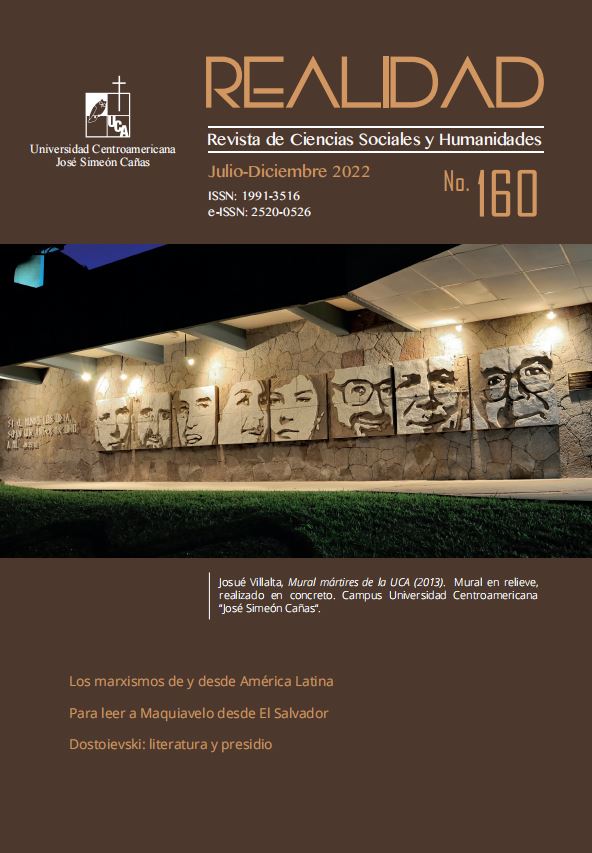Abstract
This essay engages the processes of translation and theoretical innovation, which have nurtured the Marxist currents in Latin America, in the form of dialogue with other traditions of Leftist critical thought, from Mariategui to Garcia Linera. Translation in question is often a selective one, to adequate the Marxist tools to the demands of the Latin American social realities. These translation processes go hand-in-hand with key continuous debates within the Latin American Marxisms, such as the discussions about possible universalization of the identity struggles—such as indigenous and feminist—and their articulation, beyond the proletariat as the classic Marxist subject of history; and the drive to produce, from Latin America, the Marxist thought as situated thought that refl ects on the peripheric social realities, linked to the anti-imperialist struggles and to the search for South-South collaboration.
Realidad: Revista de Ciencias Sociales y Humanidades No. 160, 2022: 11-34.
References
Acha, O. y D Antonio, D. (2010). Cartografía y perspectivas del “marxismo latinoamericano”. Contracorriente, 7(2), 210–256.
Baker, P., Feldman, I. A., Geddes, M., Lagos Rojas, F. y Pareja, R. (2019). Latin American Marxisms in context: Past and present. Cambridge Scholars Publishing.
Boron, A. (2006). Clase inaugural. Por el necesario (y demorado) retorno al Marxismo. En: Boron, A., Amadeo, J. y González, S. (Comps.) La teoría marxista hoy. CLACSO, 35–52. http://biblioteca.clacso.edu.ar/clacso/formacion-virtual/20100720062844/boron.pdf
Cortés, M. (2010). La traducción como búsqueda de un marxismo latinoamericano: La trayectoria intelectual de José Aricó. A Contracorriente: Una Revista de Estudios Latinoamericanos, 7(3), 145–167.
Dussel, E. (1988). Teología de la liberación y marxismo. Cuadernos americanos, II(12), 138–159.
Dussel, E. (1994). El eurocentrismo. En 1492.El encubrimiento del otro. Hacia el origen del mito de la modernidad. Plural Editores.
Feldman, I. A. (2015). The Re-encounter of Indianismo and Marxism in the Work of Álvaro García Linera. Viewpoint Magazine. https://www.viewpointmag.com/2015/02/25/the-re-encounter-of-indianismo-and-marxism-in-the-work-of-alvaro-garcia-linera/
García Linera, Á. (2007). “El desencuentro de dos razones revolucionarias: indianismo y marxismo”. Cuadernos del Pensamiento Crítico Latinoamericano, 3, 1–12.
García Linera, Á. (2009). ¿Es el Manifiesto comunista un arcaísmo político, un recuerdo literario? Cuatro tesis sobre su actualidad histórica (1999). En La potencia plebeya: Acción colectiva e identidades indígenas, obreras y populares en Bolivia (pp. 71–170). Colección CLACSO Coediciones- Siglo del Hombre Editores.
Guerrero, G. (2021). Books, Markets and Agents: Latin American Literature’s materialities in global times.
Harvey, D. (2007). Neoliberalism as Creative Destruction. The Annals of the American Academy of Political and Social Science, 610, 22–44.
Hinkelammert, F. (1981). Las armas ideológicas de la muerte. DEI.
IIPSS Canal Youtube—YouTube. (s. f.). Recuperado 25 de febrero de 2021, de https://www.youtube.com/
“La Biblia vuelve a Palacio”: Jeanine Áñez, la nueva “presidenta” de Bolivia. (s. f.). Aristegui Noticias. Recuperado 25 de febrero de 2021, de https://aristeguinoticias.com/1311/mundo/ella-es-la-nueva-presidenta-de-bolivia/
La Biblia vuelve al palacio. (s. f.). América Latina en movimiento. Recuperado 25 de febrero de 2021, de https://www.alainet.org/es/articulo/203482
Lema Habash, N. (2019). The Problem of Enclosure in José Carlos Mariátegui’s Seven Interpretative Essays on Peruvian Reality. En Latin
American Marxisms in context: Past and present. (pp. 91–112). Cambridge Scholars Publishing.
Lema Silva, L. (2019). José Carlos Mariátegui’s Artistic Criticism: For a Broader Approach to Aesthetics’ Emancipatory Potential. En Latin American Marxisms in context: Past and present (pp. 179–204). Cambridge Scholars Publishing.
Löwy, M., y Pearlman, M. (Eds.). (1992). Marxism in Latin America from 1909 to the present: An anthology. Humanities Press.
Lucero, J. A. (2008). Fanon in the Andes: Fausto Reinaga, Indianismo, and the Black Atlantic. International Journal of Critical Indigenous Studies, 1(1), 10. https://doi.org/10.5204/ijcis.v1i1.19
Maldonado Torres, N. (2007). “Sobre la colonialidad del ser: Contribuciones al desarrollo de un concepto”. En El giro decolonial: Reflexiones para una diversidad epistémica más allá del capitalismo global (pp. 127–167). Siglo del Hombre Editores; Universidad Central, Instituto de Estudios Sociales Contemporáneos y Pontificia Universidad Javeriana.
Molina Velásquez, C. (2017). Cuerpo, ley y sacrificialidad: La antropología crítica de Franz J. Hinkelammert. UCA Editores.
Parodi, R. (2019). La irrupción del nombre “García Linera”: Un campo de estudios en constitución. Religación. Revista de ciencias sociales y humanidades. Vol. 4, (16), 9.
Quijano, A. (2000). Colonialidad del poder, eurocentrismo y América Latina. En E. Lander (Ed.), La colonialidad del saber: Eurocentrismo y ciencias sociales. Perspectivas Latinoamericanas, 201–246. CLACSO, Consejo Latinoamericano de Ciencias Sociales.
Reinaga, F. (2007). Manifiesto del Partido Indio de Bolivia. Wa-Gui.
Santos, B. de Sousa (2018). The end of the cognitive empire: The coming of age of epistemologies of the South. Duke University Press.
Starcenbaum, M. (2019). Entre la corrección étnica y las fases del proceso revolucionario: Formas de lo nacional-popular en el marxismo de Álvaro García Linera. Religación, 4 (16), 111–122.
Torres López, T. (2018). Comunidad y Estado en Álvaro García Linera Un análisis a través de sus lugares de enunciación (1988-2017) [Recurso electrónico] (E-Book). Ariadna Ediciones.

This work is licensed under a Creative Commons Attribution-NonCommercial 4.0 International License.
Copyright (c) 2022 Irina Feldman





